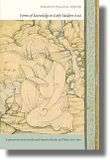Forms of Knowledge in Early Modern Asia
Pollock, Sheldon I. [Hrsg.]:
Forms of knowledge in early modern Asia : explorations in the intellectual history of India and Tibet, 1500-1800 / edited by Sheldon Pollock. - Durham [NC] : Duke University Press, 2011. - ca. 392 S. : Ill., Kt.
ISBN 978-0-8223-4882-5 / 0-8223-4882-9
US$ 89,95 (Cloth)
ISBN 978-0-8223-4904-4 / 0-8223-4904-3
US$ 24,95 (Paperback)
-- Angekündigt für Februar 2011 --
DDC: 954.02; 306.420954
Beschreibung
In the past two decades, scholars have transformed our understanding of the interactions between India and the West since the consolidation of British power in the subcontinent around 1800. While acknowledging the merits of this scholarship, Sheldon Pollock argues that knowing how colonialism changed South Asian cultures, particularly how Western modes of thought became dominant, requires knowing what was there to be changed. Yet little is known about the history of knowledge and imagination in late precolonial South Asia, about what systematic forms of thought existed, how they worked, or who produced them. This pioneering collection of essays helps to rectify this situation by addressing the ways thinkers in India and Tibet responded to a rapidly changing world in the three centuries prior to 1800. Contributors examine new forms of communication and conceptions of power that developed across the subcontinent; changing modes of literary consciousness, practices, and institutions in north India; unprecedented engagements in comparative religion, autobiography, and ethnography in the Indo-Persian sphere; and new directions in disciplinarity, medicine, and geography in Tibet. Taken together, the essays in Forms of Knowledge in Early Modern Asia inaugurate the exploration of a particularly complex intellectual terrain, while gesturing toward distinctive forms of non-Western modernity. [Verlagsinformation]
Herausgeber

SHELDON POLLOCK is the William B. Ransford Professor of Sanskrit and Indian Studies in the Department of Middle Eastern, South Asian, and African Studies at Columbia University. He is the author of The Language of the Gods in the World of Men: Sanskrit, Culture, and Power in Premodern India; the editor of a number of books, including Literary Cultures in History: Reconstructions from South Asia; and a co-editor of Cosmopolitanism, also published by Duke University Press. Profile page.
Quellen: Duke University Press; WorldCat; Library of Congress; Amazon
Ähnlich
- Llewellyn-Jones: Last King in India
- After Timur Left
- Fischer-Tiné: Shyamji Krishnavarma
- Biedermann: The Portuguese in Sri Lanka and South India
- Cederlöf: Founding an Empire on India's North-Eastern Frontiers
- Kingship in Kaśmīr (AD 1148–1459)
- Francis: Le discours royal dans l'Inde du Sud ancienne 1
- Horstmann: Jaipur 1778
- Avelar: História de Goa
- Paranjape: Making India

